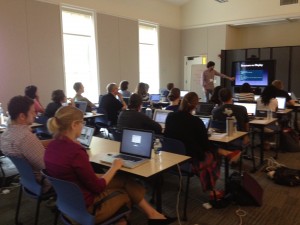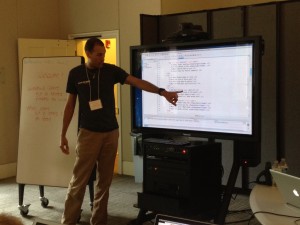The Digital Innovation Lab teamed up with ITS Research Computing to hold the first Digital Humanities Tech Bootcamp training session on June 5-7, 2013. Part of the Carolina Digital Humanities Initiative (CDHI)’s Curricular Design and Professional Development program, this pilot workshop brought together twenty faculty, staff, graduate students, and independent scholars from UNC, Duke, NCSU, Davidson College, and Asheville-Buncombe Technical Community College for a hands-on workshop on tools and approaches in the Digital Humanities.
The entire first day was devoted to the role of markup languages in the Digital Humanities. Will Shaw, Digital Humanities Technology Consultant at Duke Libraries, walked the participants through the basics of XML (Extensible Markup Language), from its syntax/rules to creating well-formed and valid documents. From there, he introduced TEI, an implementation of XML used to represent texts digitally (for instance, to create digital scholarly editions of texts). The participants worked in pairs to markup a William Blake poem, “The Tyger,” using TEI, and learned about the possibilities of using TEI for a range of texts, from unpublished manuscripts and diaries to published novels.
Day Two was devoted to data visualization. Brad Hemminger, Associate Professor in UNC’s School of Information and Library Sciences, provided an engaging overview of data visualization, from designing for human visual perception to learning how to evaluate visualizations. He introduced the group to various open-source tools available for creating visualizations, such as Simile Timeline and TimelineJS, and guided the participants through several visualization exercises. The afternoon session was devoted to learning about GIS with Amanda Henley, Geographic Information Systems Librarian at UNC’s Davis Library. She walked participants through the process of georeferencing a historic map of North Carolina, and showed them how to geocode a data set. The session ended with some hands-on work in the open-source GIS tool, ArcGIS Explorer Online.
Our final day was devoted to learning how to mount a website in order to publish a DH project. Bootcamp co-planners Joe Ryan and Pam Lach taught these sessions. Joe worked with the participants in the morning to install a LAMP stack, the foundation for any web application. He then guided the group through installing the open-source content management system, WordPress, on their local machines. In the afternoon, Pam worked with the group to load and configure DH Press, the Digital Innovation Lab’s Digital Humanities Toolkit (and a WordPress plugin). From there, each participant imported data into the tool and created their own DH project.
Overall, the sessions blended introductory content with hands-on workshop experience. While no one can become a DH or tech expert in three days, we hope the bootcamp provided participants with a broad exposure to the DH world, and gave them confidence to be able to pursue DH work of their own.
Though this bootcamp was a pilot workshop, we expect it will be the first of many such training sessions, so look for future opportunities to gain hands-on experience with DH!
Special thanks to the Institute for the Arts and Humanities for generously donating the Hyde Hall Incubator for the bootcamp. Stephanie Barnwell, DIL graduate research assistant, provided invaluable support throughout the planning and implementation process.


